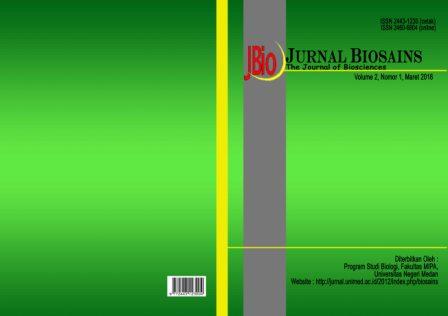Pengaruh Kitosan Terhadap Kadar Residu Pb Ginjal Tikus Putih (Rattus Sp.) Jantan Yang Dipapari Plumbum Asetat
DOI:
https://doi.org/10.24114/jbio.v2i1.4013Abstract
The study aimed to determine the effect of chitosan on the kidney of rats (Rattus sp.) exposed to lead acetate. Thirty five male animals weighing 250g were divided into 7 groups: K group as a control (without treatment), P1 received Pb (40 mg/kg bw as lead acetate), while P2, P3, and P4, all received Pb (40 mg/kg bw) and chitosan (0,5%, 0,75%, and 1% respectively). P5 group received only chitosan (1%) and P6 group received acetic acid. After 7 weeks of treatment, the animals were sacrificed and the kidneys were isolated. Kidney damage was observed with residue of Pb in kidney tissue was evaluated using Atomic Absorption Spectrophotography. Chitosan able to decrease kidney damage resulted from Pb treatment. Residue of Pb in the kidney of rat exposed to Pb acetate was decreased after chitosan treatment. In conclusion, chitosan has the ability to reduce residue of Pb after exposed Pb. The effectiveness of chitosan as a chelating agent for Pb in the organs is important for further investigated. Keywords: Pb, chitosan, kidny, residual Pb,AASDownloads
Published
Issue
Section
License
For Authors Jurnal Biosains agree to the following terms:
Authors retain copyright and grant the Jurnal Biosains (JBIO) right of first publication with the work simultaneously licensed under a Creative Commons Attribution License (CC BY-SA 4.0) that allows others to share (copy and redistribute the material in any medium or format) and adapt (remix, transform, and build upon the material) the work for any purpose, even commercially with an acknowledgement of the work's authorship and initial publication in JBIO (Jurnal Biosains)
Authors are able to enter into separate, additional contractual arrangements for the non-exclusive distribution of the journal's published version of the work (e.g., post it to an institutional repository or publish it in a book), with an acknowledgement of its initial publication in JBIO (Jurnal Biosains)
Authors are permitted and encouraged to post their work online (e.g., in institutional repositories or on their website) prior to and during the submission process, as it can lead to productive exchanges, as well as earlier and greater citation of published work (See The Effect of Open Access).


